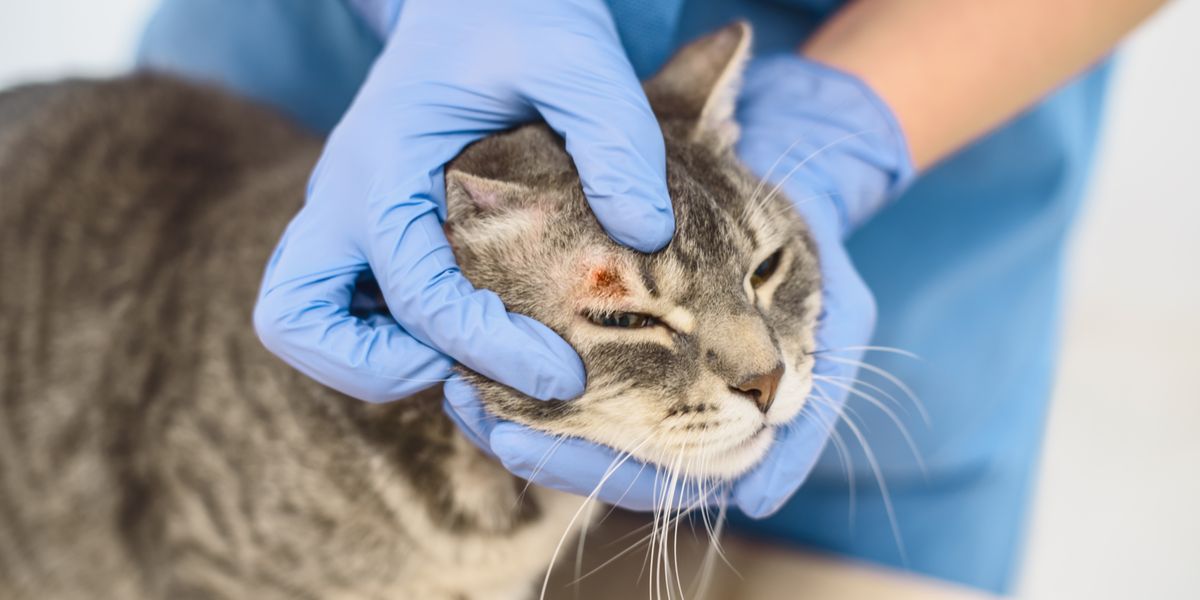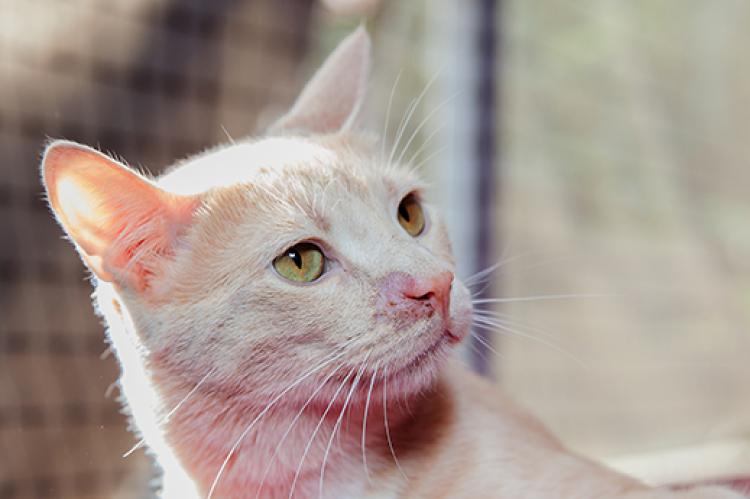To treat ringworm in cats, consult a veterinarian for proper diagnosis and a prescribed treatment plan. Ringworm is a fungal infection that requires specific medication to clear up and prevent further spread.
Seeking professional guidance is essential for effective treatment and the well-being of your cat. Ringworm is a common fungal infection that affects cats and can be a source of concern for pet owners. Apart from causing discomfort to the affected cat, ringworm can also spread to other animals and even humans.
Therefore, it is crucial to understand how to treat this condition properly. By consulting a veterinarian, you can ensure accurate diagnosis and receive a prescribed treatment plan tailored to your cat’s needs. This approach will not only provide effective treatment but also prevent the further spread of the infection. We will explore the various treatment options available for ringworm in cats, emphasizing the importance of professional guidance and proper medication.
What Is Ringworm?
Ringworm in cats, also known as dermatophytosis, is a contagious fungal infection of the skin. It is not caused by a worm, as the name suggests. Ringworm is caused by different species of fungi, including Microsporum canis and Trichophyton spp.
These fungi thrive in warm and moist environments, making cats susceptible to infection. Ringworm is highly contagious and can spread through direct contact with an infected cat, contact with contaminated bedding or grooming tools, or even through environmental surfaces. Cats with ringworm may show symptoms such as hair loss, scaly patches, and itching.
Prompt diagnosis and treatment are important to prevent the spread of ringworm to other pets or humans. Treatment options may include antifungal medication, topical ointments, and environmental decontamination. Regular cleaning and maintaining good hygiene practices can help prevent ringworm transmission in cats.
Symptoms Of Ringworm In Cats
Ringworm in cats can be identified by various symptoms. One common sign is the presence of skin lesions and hair loss. Cats may also experience itchiness and redness in affected areas. Additionally, crusty or scaly patches may develop on their skin.
It is important to diagnose ringworm early and seek proper treatment.
Diagnosis Of Ringworm In Cats
Diagnosing ringworm in cats typically involves a visual examination to identify characteristic skin lesions, such as patchy hair loss and redness. Another diagnostic tool is the Wood’s lamp test, which uses ultraviolet light to detect fluorescent fungi on the cat’s skin.
Additionally, a fungal culture may be done by collecting a sample of skin or hair and cultivating it to identify the specific fungal species causing the infection. These diagnostic methods help veterinarians confirm a ringworm diagnosis and develop an appropriate treatment plan for the affected feline.
By identifying the source of the infection, pet owners can take necessary measures to prevent its spread and provide their beloved cats with prompt and effective treatment.
Standard Treatment Options
Ringworm in cats can be effectively treated using standard treatment options. Topical antifungal medication is commonly used to kill the fungus on the skin. It is applied directly to the affected area, and regular application can help clear up the infection.
Oral antifungal medication may also be prescribed by a veterinarian to treat ringworm that is more severe or widespread. This medication works from within the cat’s body to eliminate the fungus. In addition to medication, environmental decontamination is crucial. Ringworm spores can remain in the environment, so it is important to thoroughly clean and disinfect surfaces, bedding, and toys that the infected cat has come into contact with.
By following these treatment options, you can effectively treat ringworm in cats and help them make a full recovery.
Natural Remedies For Ringworm In Cats
Ringworm is a common fungal infection that can affect cats. Natural remedies can be effective in treating ringworm in cats. One such remedy is apple cider vinegar baths. These baths can be used to help soothe the irritated skin and reduce the fungal infection.
Another natural remedy is the application of coconut oil. Coconut oil has antifungal properties that can help fight against the ringworm infection. Additionally, essential oils can be used for ringworm treatment in cats. Oils such as tea tree oil and lavender oil have antifungal properties that can help eliminate the ringworm infection.
It is important to consult with a veterinarian before using any natural remedies on your cat, as some cats may have sensitivities or allergies. By using these natural remedies, you can help treat ringworm in cats in a safe and effective way.
Preventing The Spread Of Ringworm In Cats
Ringworm is a common fungal infection that can affect cats. To prevent its spread, it is important to isolate infected cats. Regularly cleaning and disinfecting the environment can help eliminate the fungus. Practicing good hygiene, such as washing hands and avoiding contact with infected cats, is crucial.
By following these guidelines, you can effectively treat ringworm in cats and minimize its spread.
Separation And Isolation
Separation and isolation are crucial when it comes to treating ringworm in cats. Isolating infected cats in separate living spaces helps contain the spread of the fungal infection. By creating distinct living areas for infected cats, you can minimize the risk of transmission to other pets and humans in the household.
Providing each cat with its own space ensures they receive the necessary care and prevents further contamination. Proper isolation includes using separate bedding, litter boxes, and feeding dishes for infected cats. Additionally, regular cleaning and disinfection of these items is essential to prevent reinfection.
By following these guidelines, you can effectively treat ringworm in cats and protect the well-being of all pets and individuals involved.
Regular Cleaning And Disinfection
Regular cleaning and disinfection are vital for treating ringworm in cats. Cleaning infected areas thoroughly is essential. Use appropriate disinfectants to kill the ringworm spores. Laundering bedding and fabrics regularly will help eliminate any spores. Be sure to follow the manufacturer’s instructions for any cleaning products used.
Additionally, vacuum furniture and carpets to remove any stray spores. Keeping your cat’s living environment clean and disinfected is crucial in preventing the spread of ringworm. Remember to wear gloves and wash your hands thoroughly after handling an infected cat.
By following these guidelines, you can effectively treat ringworm and ensure a healthy living environment for your furry friend.
Monitoring And Vet Visits
Regular check-ups are essential for monitoring and addressing ringworm in cats. By visiting the vet regularly, you can stay proactive in detecting any symptoms of ringworm in your cat. It’s also important to monitor other cats in your household or community for any signs of the infection.
Regular observation can help prevent the spread of ringworm and ensure early treatment if necessary. With vigilant monitoring and regular vet visits, you can effectively treat ringworm in your cats and maintain their overall health and well-being. Stay attentive and proactive to protect your feline friends from ringworm and other potential health issues.

Credit: cats.com
Frequently Asked Questions Of How To Treat Ringworm In Cats
How Is Ringworm Transmitted To Cats?
Ringworm in cats is usually spread through direct contact with infected animals or contaminated objects. It can also be transmitted from humans to cats or from cats to humans. Proper hygiene and regular disinfection of cat bedding and grooming tools are essential to prevent its spread.
What Are The Common Symptoms Of Ringworm In Cats?
Common symptoms of ringworm in cats include circular patches of hair loss, scaly or crusty skin, itching, and redness. Some cats may develop a raised, circular lesion that resembles a ring. It’s important to consult a veterinarian for proper diagnosis and treatment if you suspect your cat has ringworm.
How Is Ringworm Diagnosed In Cats?
Ringworm in cats can be diagnosed through various methods, including visual examination, Wood’s lamp test, fungal cultures, and microscopic examination of skin scrapings or hair samples. Your veterinarian will determine the most appropriate diagnostic method based on your cat’s symptoms and medical history.
Conclusion
Treating ringworm in cats requires a combination of proactive measures and medical intervention. Maintaining cleanliness and regularly disinfecting your cat’s living space can help prevent the spread of the infection. Additionally, providing a balanced diet and ensuring your cat has a strong immune system can aid in their recovery.
It’s crucial to consult a veterinarian for a proper diagnosis and treatment plan, as they may recommend antifungal medications or topical creams to alleviate symptoms. Regularly monitoring your cat’s progress and diligently following the prescribed treatment is essential for successful management of ringworm.
By following these steps and providing your cat with the proper care, you can effectively treat ringworm and minimize the risk of recurrence. Don’t hesitate to reach out to your veterinarian for guidance and support throughout the treatment process. Your furry friend will thank you for it!



